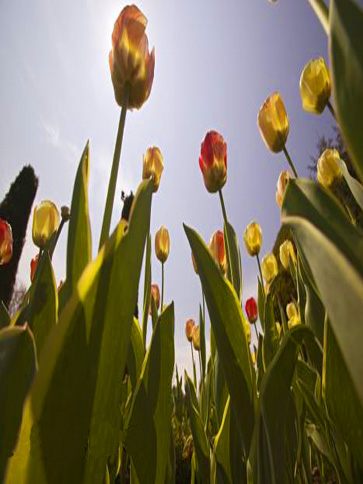Plant Your Own Garden

The other day I got the idea that I would prune my mother’s trees. I’d had enough of looking at those monster trees and thought she might like to have a nice tidy garden, come outside and have a cup of tea while enjoying her day. I created a whole scenario in my head where she would be seduced from her hermetic existence to sit outside in the shade and get some sun. Her cat would be allowed outside, as long as she was there, to stalk and explore. So I set out to shape her trees.
About an hour into my work, I began to reflect on how it seems that one tree—in this case overgrown bush—has so much in abundance. I thought about how I had about a couple of days’ supply of firewood already, and I hadn’t even completed the task. Do we really need to cut down forests when one tree can yield so much wood and still be allowed to live?
I pruned only five trees and had filled over twelve large garbage bags with branches and leaves. Imagine if I had pruned an acre. I wouldn’t be able to do it, but with assistance I could yield several hundred if not a thousand bags of excess branches and leaves.
When I was a child, I thought the world was infinite. The earth would always give up her gifts to me if I wanted. I watched my father garden and was in awe every harvest. We had so many tomatoes, squash, greens, okra, and eggplants. We had so much from such a small piece of land, less than 1/4 of an acre. I hadn’t yet noticed how this compared to others devastated by famine and wars.
When I grew older and became aware of global suffering, I had the sense of putting my hand in front of a tidal wave to stop it. What could I do? Absolutely nothing but be overwhelmed and drowned by the momentum of the rushing waves. If I survived the waves, I would be crushed by everything that they carried away.
I discovered that because we are a greedy people, our mouths open like baby birds wanting to be fed, taking and seldom giving, we are destroying and depleting the earth. When we see others in need with their hands out, we turn away. We don’t want the ugly picture of suffering to put the taste of bile in our mouths, thus embittering our oasis.
We exist on an oasis. It may not always feel that way. We have our own homeless, our own crime, and our own areas of famine. Overall, however, we exist on an oasis, and in the majority of the world, people have to struggle to obtain their next meal.
It causes me sadness. What can I do? How can I change the world?
As I raked up branches and leaves and filled bags, I thought about this. What could one person do? What can I do?
One person can foster a sense of gratitude that we won the lottery of life. We eat and live in relative peace compared to many other parts of the world. An individual can start making changes that will add to others’ efforts to create a wave that could begin to form from unified efforts, such as choosing what we purchase, how we eat, what we eat. Choosing to rein in some of our desires.
In America, we consume most of the world’s resources but yet only comprise a small fraction of the population. One person can make a difference and influence others.
I’ve chosen to consume less. I do need to drive from place to place, but sometimes I choose to walk and ride my bicycle. Maybe we can choose work that is closer to home. Maybe we can choose to carpool. If we can’t make that choice, maybe we can choose to grow some of our own food, thus placing a smaller demand on the supply. Maybe I can choose to plant drought-friendly plants, using less water. Maybe I can choose to be aware and do what I can, whatever that is, to help make the world a better place.
After admiring how lovely I made my mother’s trees, I tied up twelve bags of branches and leaves, put them in the garage for trash day, and realized that by composting I could take that refuse and make from it something beautiful. In a small way, my garden could contribute to making the world a better place and I could make the earth groan less under the pressure we’ve placed on her.
Lisa Trimarchi